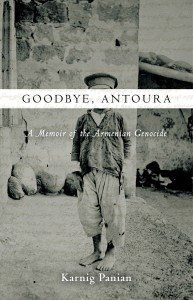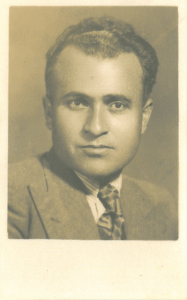April 24, 2015 marks the Centennial of the Armenian Genocide, one of the most horrific events of the 20th century.
Goodbye Antoura, by Karnig Panian, is one boy’s story.

In 1915, 5-year-old Karnig Panian was living among his fellow Armenians in the Anatolian village of Gurin. Four years later, American aid workers found him at a Turkish-run orphanage in Antoura, Lebanon. He was among nearly 1,000 Armenian and 400 Kurdish children who had been abandoned by the Turkish administrators, left to survive at the orphanage without adult care. This extraordinary memoir tells the story of what happened in between.
Goodbye, Antoura: A Memoir of the Armenian Genocide (Stanford University Press) follows Panian from his idyllic childhood through the mass Ottoman expulsion of Armenians during World War I. Following his father’s conscription into the Turkish Army, where he was forced into hard labor and ultimately driven to his death, Panian, his mother, sister, and grandfather were force-marched from their village and through the Syrian desert. After his family died in a refugee camp, Panian was taken to the Orphanage of Antoura in Lebanon, where he suffered from hunger and mistreatment. There, administrators—some cruel, some benign—sought, often through violent means, to transform the children into Turks by changing their Armenian names, forcing them to speak Turkish, forbidding any mention of their religion—effectively erasing their history.
But the children showed a remarkable degree of courage, resilience, and resistance. A small band of them, including Panian, managed occasionally to climb the walls of the desecrated former monastery that housed the orphanage and forage for food. They even managed to escape briefly, retreating to the surrounding countryside and trying to live off of what they could find. When survival became too difficult they returned to the orphanage, only to find that the war had ended and the adults had fled.
Panian’s memoir is a full-throated story of loss, strength, and survival told without bitterness or sentimentality. His

story shows us how even young children recognize injustice and can organize against it and form a sense of identity that they will fight to maintain. He paints a painfully rich and detailed picture of the lives and agency of Armenian orphans during the darkest days of World War I. Goodbye, Antoura assures us of how humanity, once denied, can be again reclaimed.
***
Karnig Panian was a longtime educator and vice-principal at Djemaran, the Armenian Lyceum, based in Beirut, Lebanon. Simon Beugekian translated the book. Vahe Habeshian made revisions and added explanatory footnotes. Panian’s daughter, Houry Panian Boyamian, wrote the acknowledgments. A host of scholars championed this project. Prof. Aram Goudsouzian edited the initial draft prior to its submission to Stanford University Press and provided thorough revisions before its publication. Prof. Keith Watenpaugh was an outstanding advocate for the book, and his introduction and afterword artfully provide the necessary historical context on the Great War and the Armenian Genocide. Prof. Richard Hovannisian attested to the importance of this memoir in his endorsement and Dr. Vartan Gregorian wrote a heartfelt foreword to the book.



Please let me know if the book is available in print version, and if so, where can we order one?
thanks
Thanks for the new book published information
The book is available on Amazon and is indeed available in print format: http://www.amazon.com/Goodbye-Antoura-Memoir-Armenian-Genocide/dp/0804795436/ref=sr_1_1?ie=UTF8&qid=1427335449&sr=8-1&keywords=goodbye+antoura
Interested to have a copy of the book named “Goodby Antoura”
This is addressed to Houri Panian Boyamian: when writing the acknowledgements, please don’t forget to add my Dad’s name, Haroutioun Ghazarian, who at your Dad’s request, helped him reminisce their life at the orphanage. My dear Dad was an orphan too, from Adapazar (near Istambul), who ended up in Lebanon too! Thank you!
This is not one boy’s story. This is a story of the Armenian Genocide and the faith of hundreds of thousands Armenian orphans and the refection of their miserable journey.